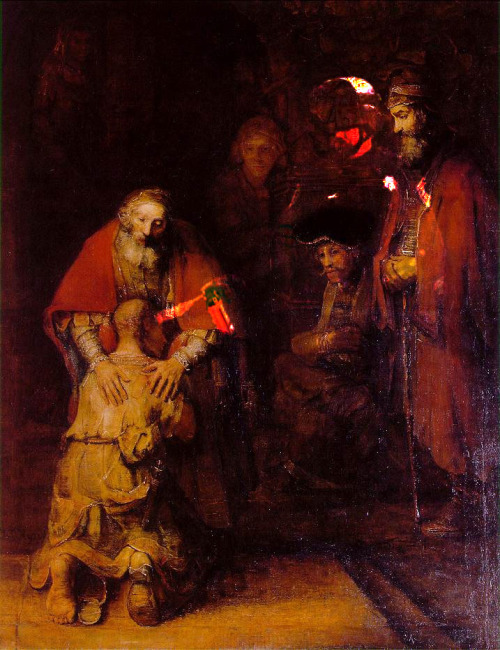
Salon’s Mary Elizabeth Williams thinks very highly of the “Pepper-Spray Cop” internet meme, which in its various forms spoofs UC Davis police officer John Pike. Last Wednesday, Pike was captured on video, pepper-spraying a row of demonstrators, who were sitting with limbs interlocked to protest the removal of their tents. Now, thanks to Photoshop and the muse, Pike gets up to all sorts of monkeyshines. Visitors to one Tumblr account, for example, can catch him blasting Rembrandt’s Prodigal Son, and the naked luncher in Manet’s Le Dejeuner sur l’Herbe. Williams proclaims it a “geeky triumph,” proof that “If you want to vanquish the enemy, render him absurd.”
But a little later on, Williams gets confused and turns her declaration of victory on its head: “We don’t laugh at the Pikes of the world because we are not incensed at their abuses of power or because we don’t take their actions seriously,” she writes. “We do it because we take them very seriously, indeed. But without billy clubs and guns and tear gas, sometimes, laughter is the only weapon we’ve got.”
The humor of the powerless goes by the name gallows humor. Any joke in that tradition hinges on the inevitability of disappointment and misery. It is not without its fortifying effects. Freud (whose quote, I admit, I’m lifting from Wikipedia), wrote: “The ego refuses to be distressed by the provocations of reality, to let itself be compelled to suffer. It insists that it cannot be affected by the traumas of the external world; it shows, in fact, that such traumas are no more than occasions for it to gain pleasure.” In other words, gallows humor shows the bad guys that they can kill you but not eat you. Or your cigar. Or whatever.
Johnny Cash’s novelty hit, “Twenty-Five Minutes to Go,” is an example of gallows humor set on an actual gallows. Indeed, a gallows is the perfect place for it. Knowing Johnny Cash, there’s probably a damn good reason the guy in the song is about to be married off to the ropemaker’s daughter. His fate represents no wrong, and demands no redress. If showing off his ego strength on the way will make him feel better, then he might as well go for it. Society can afford to indulge him that far; in fact, in those days when hangings at Tyburn drew mobs, a “good death” ensured everyone went home feeling a little better.
In Born to Kvetch, Michael Wex explains the art of the klole, or Yiddish malediction, which worked by turning a listener’s own morbid imagination against him. My pick from this genre is: “May you grow strong and healthy…and always have to ask what the weather’s like outside.” Since what’s confining the victim can’t be a physical problem, only three possibilities remain: 1) he’s been pinched by the Okhrana and banged up in the dread Fortress of Ss. Peter and Paul; 2) he’s gone barking mad; or 3) first one, then t’other. Orthodox Jews of the 19th century believed irritations like tsarist tyranny and schizophrenia were the Messiah’s to correct. In the meantime, why not laugh at them, especially if you could make the joke at someone else’s expense?
But this here is America, not Anatevka. We’re not fiddlers on the roof, nor were the kids at Davis train-robbing gunslingers. Historically, we Americans have believed that when police officers use excessive force against people who are annoying but harmless, then someone damn well ought to do something. Some folks already have. My admiration goes to whoever placed Lieutenant Pike and UC Davis Police Chief Annette Spicuzza on administrative leave, as well as the general assembly that voted to stage a university-wide strike. These are the kinds of gestures that make the abuse of power into a bad career move.
When Thomas Hoepker released a photo of five Brooklynites sitting by the waterfront and watching the Twin Towers smolder, New York Times columnist Frank Rich read into their attitude a self-destructive casualness. His reading turned out, very quickly, to have been a misreading. Some of the people who appeared in the photo identified themselves and declared for the record they’d been as stressed out as anyone else, whether or not they happened to look it. I won’t make that mistake about the “Pepper-Spray Cop” meme-smiths: they’re obviously acting from a sincere and well-founded outrage. Besides, the Photoshopped images are a hoot.
But I do wonder whether Americans are coming to share Williams’ sense that “laughter is the only weapon we’ve got.” In his travel essay, “Thirty-Six Hours in Managua,” P.J. O’Rourke writes mournfully that Nicaraguans under the Sandinista government were losing “that loud, rude, cynical Latin American laugh.” Instead, they were adopting the dry “humor of perfect resignation” he’d found beyond the Iron Curtain. O’Rourke cites as an example the guide who showed him a burned-out factory and explained that it now belonged to the workers.
These days, with the economy in tatters and the middle class an endangered species, something seems broken. OWS activism is a product of desperation, and just beyond desperation lies despair. Rather than laughing at the absurdity of a cop pepper-spraying, say, Seurat’s picnickers, are we actually armoring ourselves in expectation of a world where such an event might not be so absurd at all?











